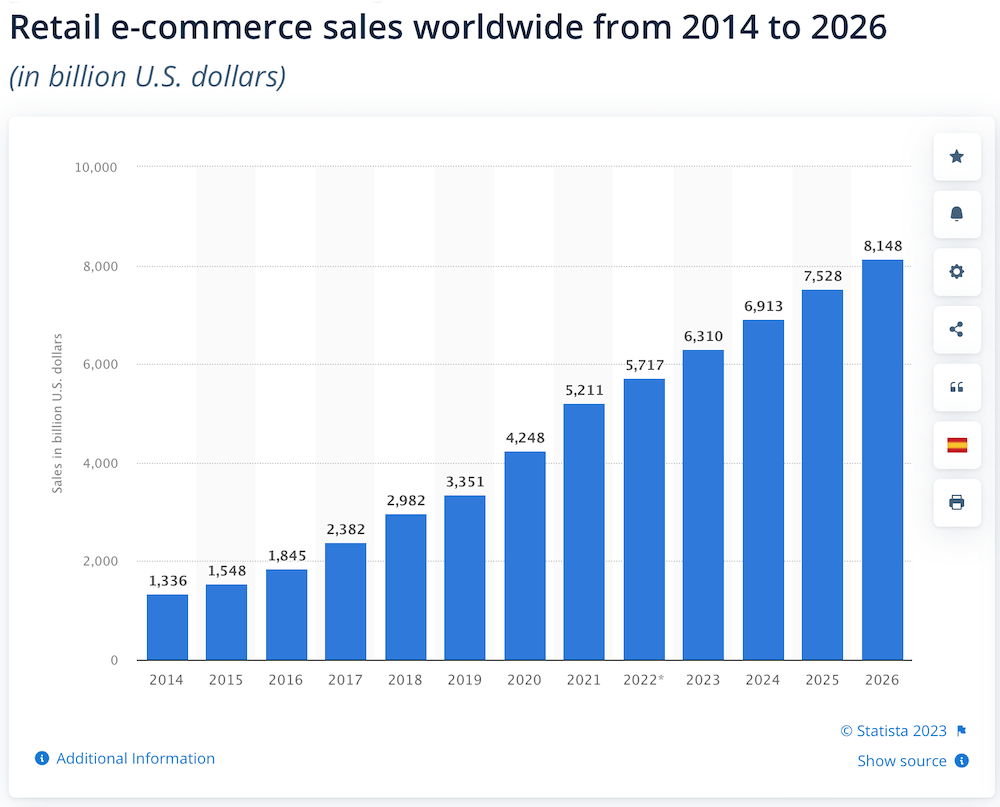We have never before included heavy academic papers (ecommerce) in our blog, but when a study on the external influences on consumer ecommerce came along, relating so pertinently to our clients, we believed it had to be included. So this study is from The School of Management, Hefei University of Technology.
The last decade has witnessed the rapid expansion of online commerce,

Source: Statista.
and this growth has been fuelled by the rapid adoption of technology, improving standards of living, an increasingly younger population and economically advancing middle class with a greater increase in wealth. Increasing global access to the Internet through broadband, as is the use of smartphones and tablets.
Previous studies on ecommerce have empirically examined online shopping intentions, traditional mall shopping, and mobile shopping, the emotional influence of online buying, online buying motivation, and the effects of hedonic and utilitarian intentions on user behaviour (Lin & Lu, 2015). They established that consumers’ online buying intentions are involved and affected by environmental factors.
Considering that online shopping intentions are a self-evaluated sentiment of enjoyment and an effect of perceived ease of use (PEU) and perceived usefulness (PU), examining the adoption of online shopping intentions in emerging markets from a psychological viewpoint is significant.
In this perspective, the Stimulus-Organism-Response (SOR) paradigm gives a structured way to investigate the effects of high-tech elements as internal/external environmental stimuli on consumers’ experiences towards online shopping.
System and service quality (SSQ)
The quality of a system and service is significantly linked to consumers’ opinions about new technology. As online shopping platforms provide products and services to consumers through their online systems, SSQ works as a significant external stimulus that affects shoppers’ affective and cognitive responses.
Utilitarian shopping orientation (USO)
The consumption model focused on the significance sought in the course of ingestion practice may be inclined by individual variances. A utilitarian (economic) shopping orientation entails the tendency to seek instrumental value (e.g., a saving of time, money or effort),” while they always try to reduce time spent and effort in search and purchasing of a product. The interactivity of a website or ecommerce email is also perceived as proposing utilitarian sides of reducing effort and time, risk, and growing chances of searching for a better substitute.
Hedonic shopping orientation (HSO)
A hedonic (fun) shopping orientation demands the propensity to pursue practical worth (e.g., fun). Numerous studies have emphasised that hedonic orientation drives consumers’ usage behaviour. Hedonic shoppers are involved in looking for products, enjoying their experience of shopping, and taking shopping as relaxation. Online shopping not only offers a hedonic aspect, but it does so at the leisure of the consumer, in their home or at work, when they want.
Perceived Usefulness
Perceived usefulness is the degree to which a person believes that using a particular system would enhance his/her job performance. Perceived usefulness has been broadly adopted in numerous studies on online social networks and shopping through Smartphone technology studies to describe consumers’ online shopping intention.
Therefore, it can be better determined that perceived usefulness plays the role of the key driver in consumers’ online shopping intentions. Also, it is expected that this cognitive response of consumers could then affect their online buying intention (e.g., their reaction).
Perceived Ease of Use
Perceived eye of use is the degree to which a person believes that using a particular system would be free of effort, which is a key driver for the acceptance/ adoption of applications based on new technologies.
Accordingly, the better the PEU of the online shopping environment, the more progressive the consumers’ intention towards its adoption/usage, so the higher the prospect that it will be used. Additionally, PEU is supposed to have an indirect influence on consumers’ behavioural intention towards the adoption of new technologies through perceived usefulness in an online shopping context too. Thus, PEU is further supposed to have an indirect influence on consumers’ intentions through PU.
Perceived Enjoyment
Perceived enjoyment has immense applicability in affecting the consumers’ intention to use pleasure-oriented information systems and hedonic platforms, for example, online social networks. PE is the extent to which the activity of using the computer is perceived to be enjoyable in its own right, apart from any performance consequences that may be anticipated.”
In an online shopping environment, enjoyment has a significant influence on consumers’ attitudes in ecommerce. Investigations into recreational and economical shopping through webpages noted the relationship between consumers’ online shopping intentions and perceived enjoyment has been confirmed by various studies. Perceived enjoyment positively influences consumers’ online shopping intentions.
Discussions and implication for consumer ecommerce
This study shed light on consumers’ online shopping intentions through the proposed model, which considers system and service quality as external and utilitarian, hedonic shopping orientation as internal environmental stimulus; perceived usefulness perceived ease of use, and perceived enjoyment as the person’s inner organism changes; and online shopping intention as the response.
This study tried to explain the consumers’ online shopping intentions by using the SOR paradigm. By using the theoretical lens of the SOR paradigm, the model successfully combined the “DeLone and McLean Model of Information System Success”, the technology Acceptance Model”, and The “Motivation Theory”.
Overall, the proposed model provides a predictive accuracy (R2 = 0.683) for consumers’ online shopping intention. These findings back the use of the proposed model; hence, the suggested model is supposed to disclose some new insights and possible implications to scholars.
The PLS-SEM outcome yields four key results:
(1) The external effect of the environmental stimulus (system and service quality), affects perceived usefulness, perceived ease of use toward online shopping system, and perceived enjoyment.
(2) The internal effect of the stimulus, utilitarian and hedonic shopping orientation, significantly affects the organism process, containing perceived usefulness, perceived ease of use toward online shopping systems, and perceived enjoyment.
(3) Perceived usefulness, perceived ease of use, and perceived enjoyment affect consumers’ purchase intention.
(4) Perceived personalisation of product offerings in communication directly relates to the perceived enjoyment of that specific retailer and increases the consumers’ purchase intentions.
Overall, the application of the SOR paradigm has been acknowledged from the perspective of consumer’s online shopping intentions. All environmental stimuli can affect consumers’ cognitive (perceived usefulness, perceived ease of use, and perceived pertinence to them – personalisation) and affective (perceived enjoyment) responses, which subsequently play a vital role among stimuli and responses (consumers’ online shopping intentions).

Theoretical Implications for Consumer ecommerce
First, earlier studies have examined both utilitarian and hedonic orientations in the consumption behaviour context, but this study indicates that utilitarian and hedonic orientations significantly directly influence shoppers’ usefulness, ease of use, and enjoyment, while indirectly influencing their online shopping intentions.
This study discovered that the shopping propensity of individual consumers was emotionally enhanced with the degree of personalisation the retailer made toward that individual, which is in line with the findings of earlier studies.
Second, In line with earlier studies, perceived ease of use (being offered products uniquely appropriate to that individual) was found to have a significant effect on perceived usefulness and shopping intention. This result shows that when the consumer perceives personalised communication that is pertinent to them alone, he/she may develop a positive intention for their desire to interact (buy the product) with the system.
This positive link could be endorsed by the fact that consumers are keen to adopt online shopping based on hyper-personalisation. Such consumers eventually tend to build their affinity with a retailer.
Marketing managerial implications for Consumer ecommerce
Marketing managers are strongly encouraged to improve their system and service quality, as this specific aspect is of great significance for the perceived enjoyment of consumers in using personalisation at the centre of their effectiveness. Managers should ensure that their systems execute transactions safely and timely, offer real-time consumer service, and justify issues among shoppers and merchants easily and quickly.





